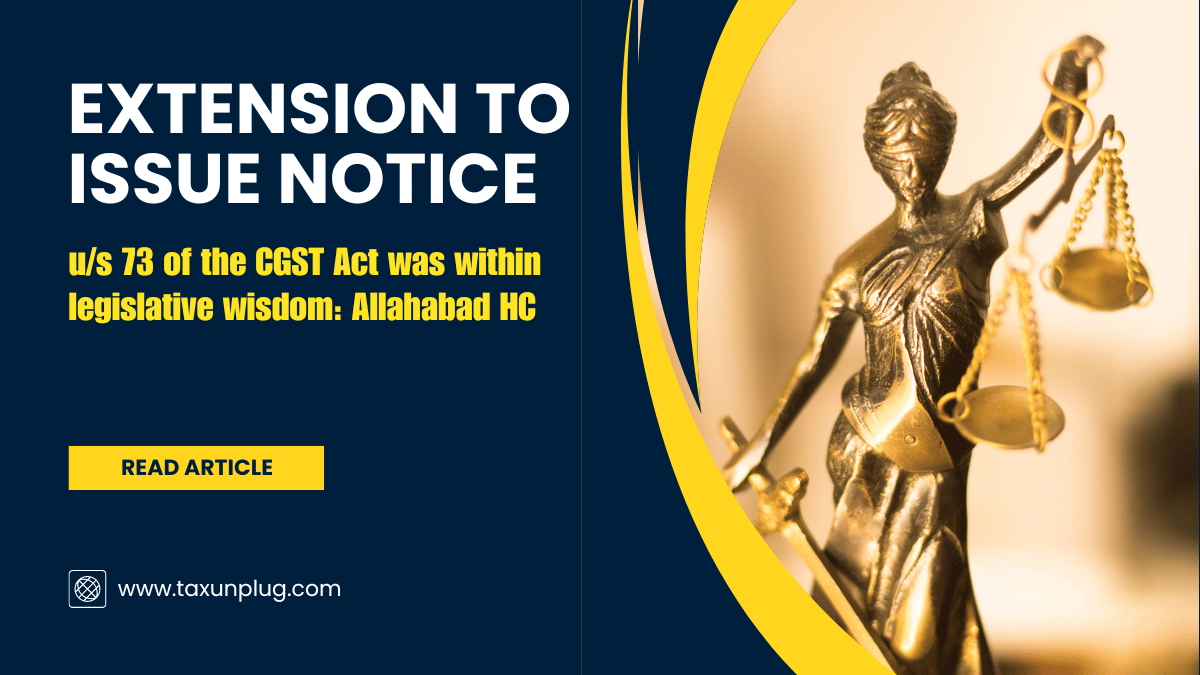Extension to issue notice u/s 73 of the CGST Act
The Allahabad High Court dismissed several petitions against Section 73 GST notices, citing the extended period of limitation. The petitioners challenged adjudication proceedings for F.Y. 2017-18, citing issues such as adjudication orders exceeding show cause notice, violating principles of natural justice, and correction of GSTR-3B. The Senior Advocate argued that the legislature did not intend to grant blanket time extension.
The general power to grant extension in Section 172 of the CGST Act is subject to the direct check of the legislature, and the government must seek approval from the respective legislative body. Therefore, there was no extension of time to file the Annual Return for F.Y. 2017-18 beyond 07.02.2020 or pass an adjudication order beyond 06.02.2023. Notification No. 14 of 2021 did not affect the limitation to pass the adjudication order for F.Y. 2017-18, as the period of limitation, extended up to 30.06.2021, was only for acts that could not be completed or compiled during 15.03.2020 to 20.08.2020.
The counsel argued that the impugned notifications are ultra vires to Section 168A of the CGST Act, as they could have been issued due to ‘force majeure’ circumstances. The counsel also argued that the impugned notifications are discriminatory, as they partially modified earlier notifications issued by the Central and State Governments. The revenue counsel argued that inconsistency can be determined not solely by the language of Section 168A but also by examining the context in which it has been incorporated. The court found the exercise of power unreasonable.
The Explanation of Section 168A of the CGST Act includes a residuary clause that includes events that may affect the implementation of the Act’s provisions. The Explanation’s last words expand its applicability to other circumstances not directly due to unforeseen and clearly definable “force majeure” circumstances. For example, disruption of revenue functioning over a long period could fall under the “otherwise affected the implementation of the Act” description. This discussion is also mentioned in the Council’s minutes.
The Central and State Governments’ actions are in line with Section 168A of the CGST Act. The Central Board of Indirect Taxes and Customs (CBIC) argued that neither the Council nor the Government acted mechanically. The Explanation to the section offers an inclusive definition of “force majeure” such as war, epidemic, flood, drought, fire, cyclone, earthquake, or any other calamity caused by nature. The power may be exercised in situations where the implementation of the CGST Actmay be impaired, necessitating extension of time limits. The recommendation of the Council to issue notifications to extend time limits exists.
The bench emphasized that the COVID-19 pandemic has had the darkest period in recent history, disrupting human activities across all continents and leaving no strata of society unaffected. They also noted that the last date for filing the Annual Return for the F.Y. 2017-18 was extended to 7.2.2020, preventing any scrutiny or audit from being conducted before that day. The Division Bench concluded that the revenue authorities were not merely experiencing difficulties, but rather a temporary or transient impairment.
The revenue authorities were disabled due to COVID-19, but life continued with businesses and monthly and annual returns filed. Legislative decisions were made to address the disruption, and the Proper Officer’s authority remained independent of audit and scrutiny.
The CGST Act has specific provisions that dictate the procedure for implementing laws. The court ruled that if a legislature acts to provide for a law related to a specific circumstance or mischief, no fault can be found. The court also noted that the Council’s partial modification of the first-time extension was within legislative wisdom. The court dismissed writ petitions challenging the issuance of the notifications, stating that adjudication proceedings may recommence and be concluded after excluding the extended limitation. The court also stated that petitioners have 45 days to file appeals.
To download official order, click here.
“The site is for information purposes only and does not provide legal advice of any sort. Viewing this site, receipt of information contained on this site, or the transmission of information from or to this site does not constitute an attorney-client relationship.
The information on this site is not intended to be a substitute for professional advice.”

